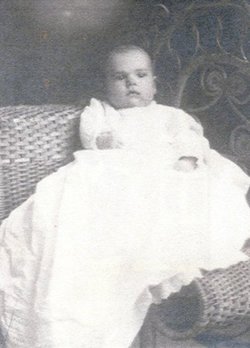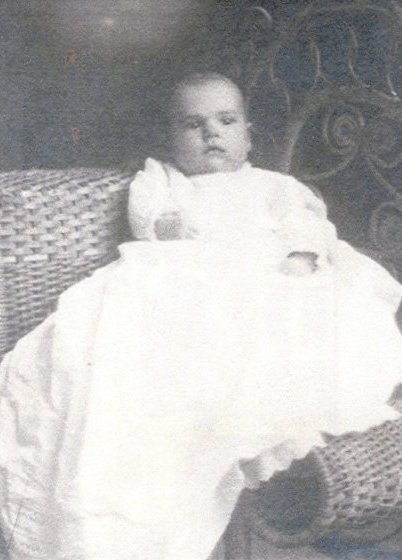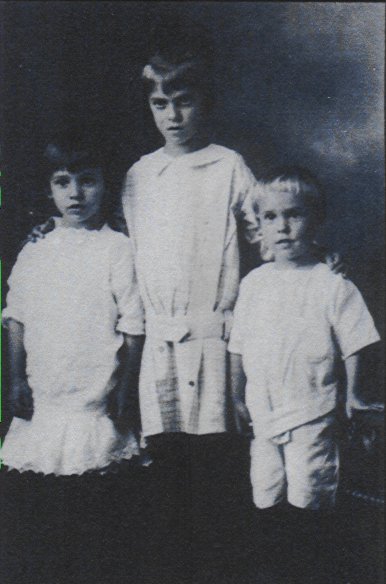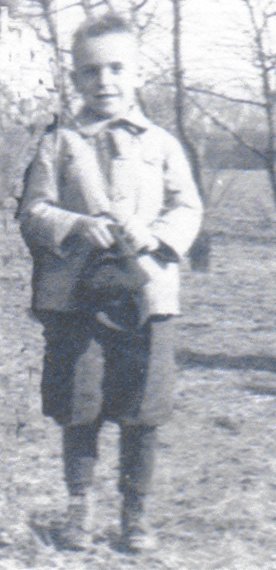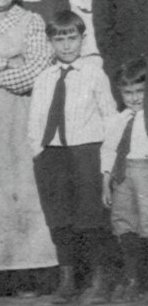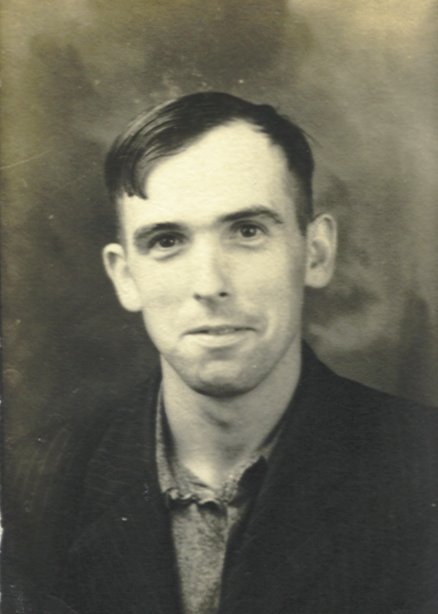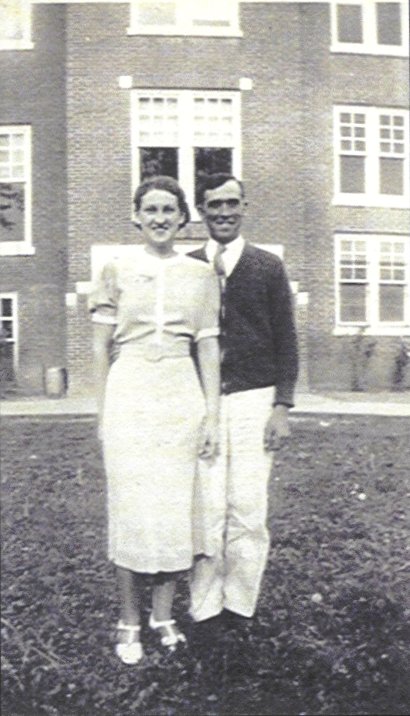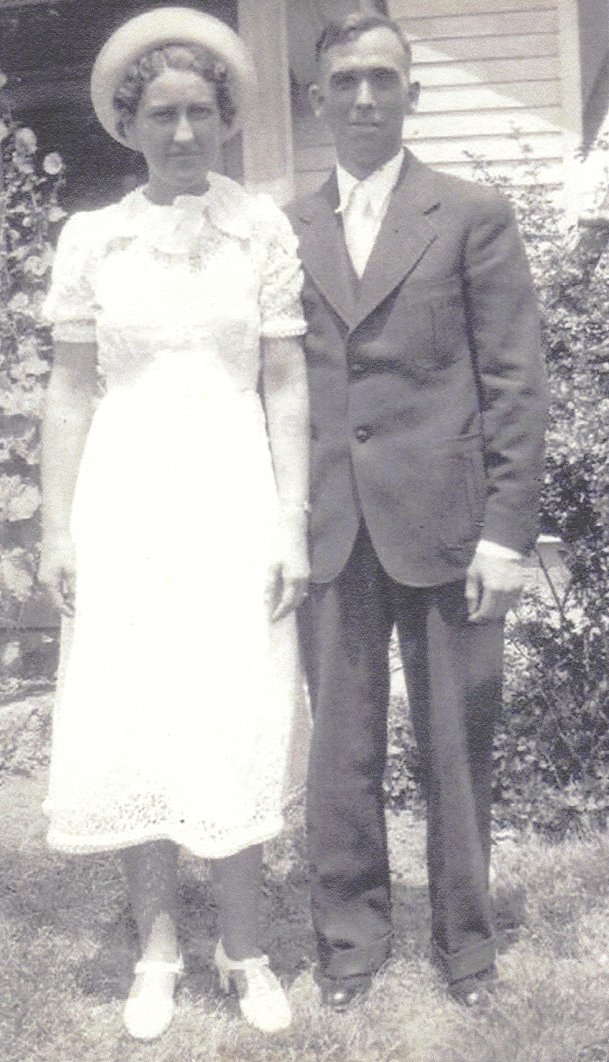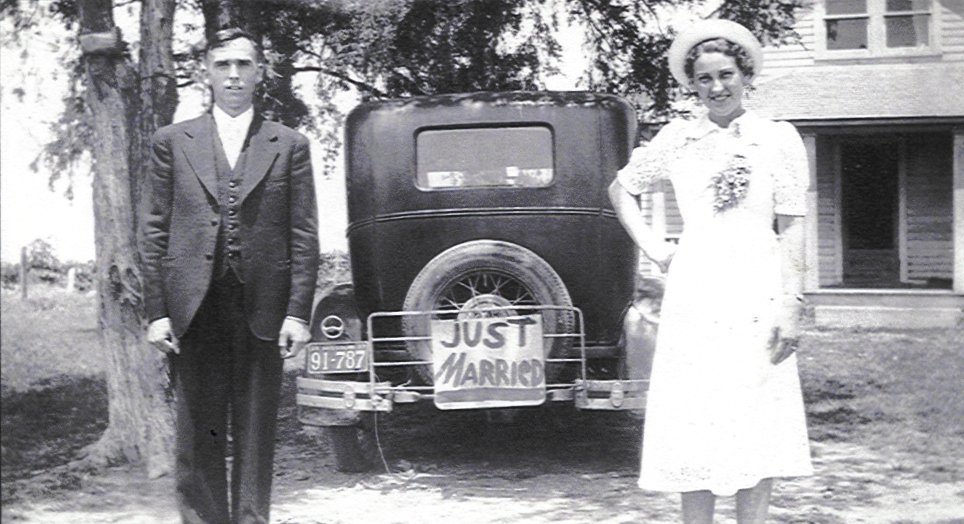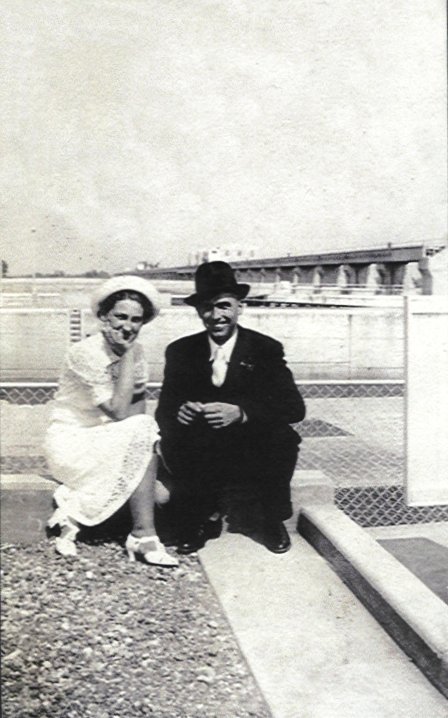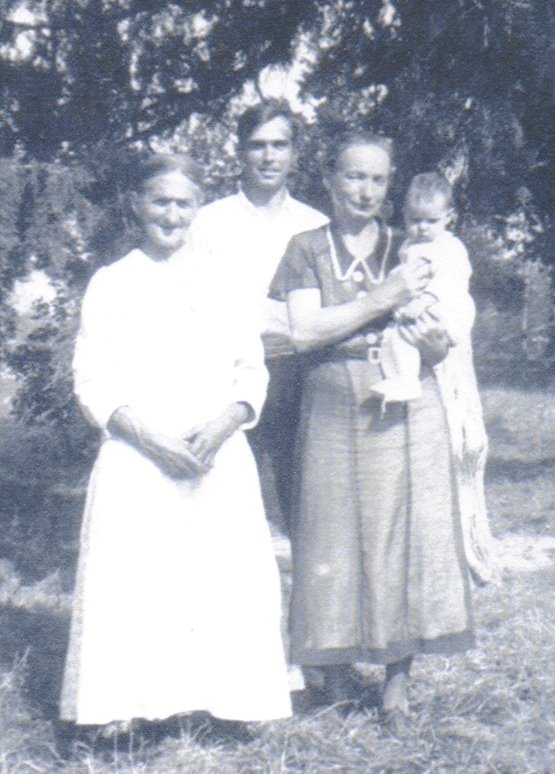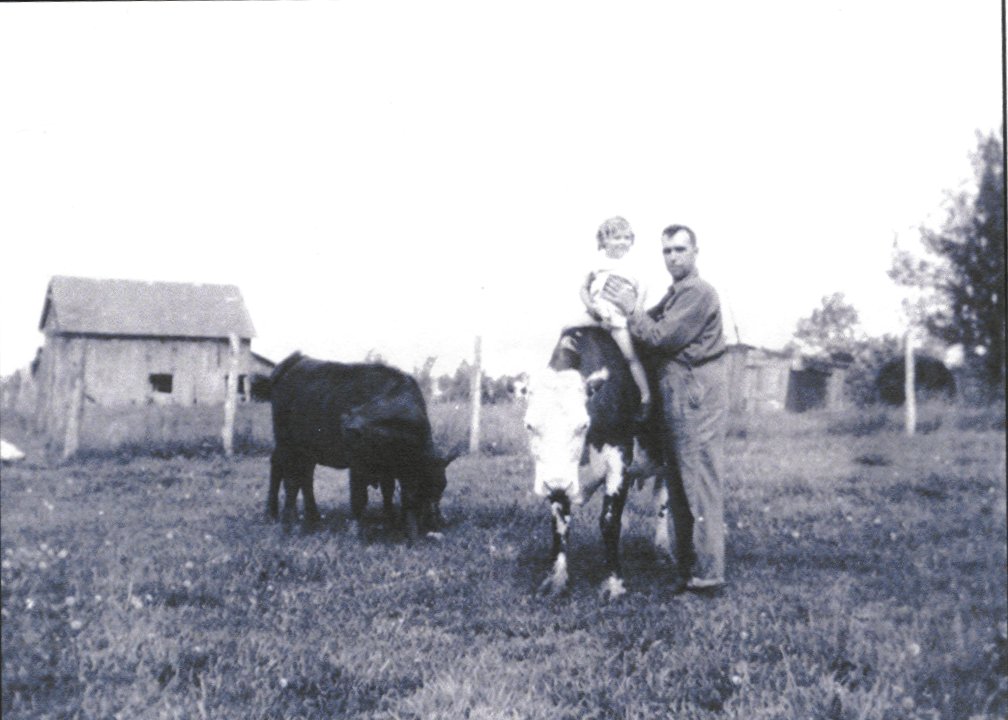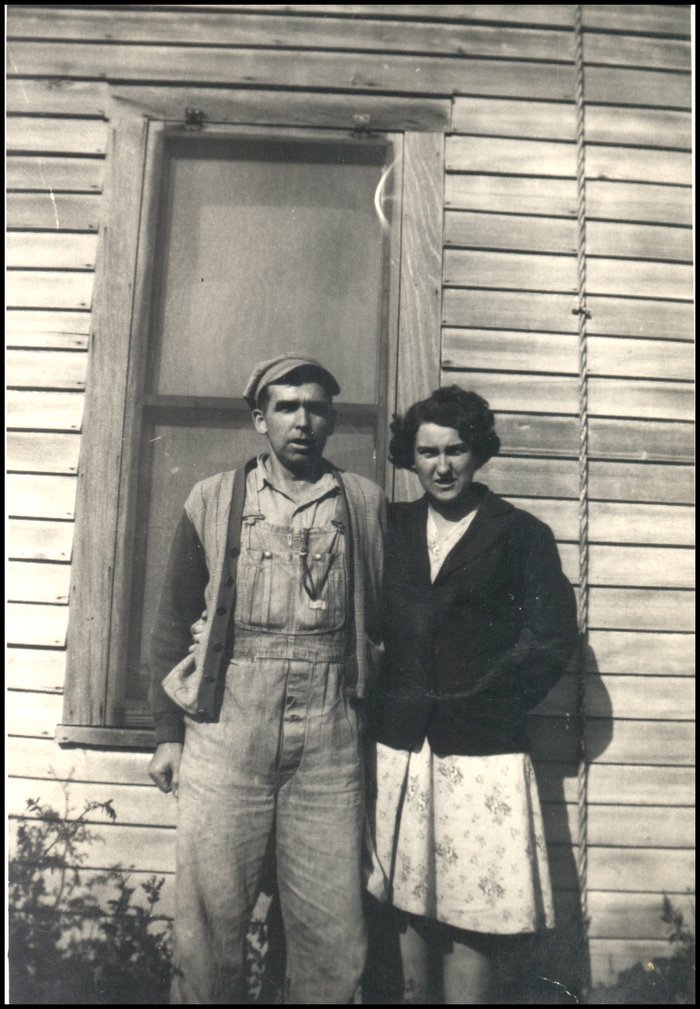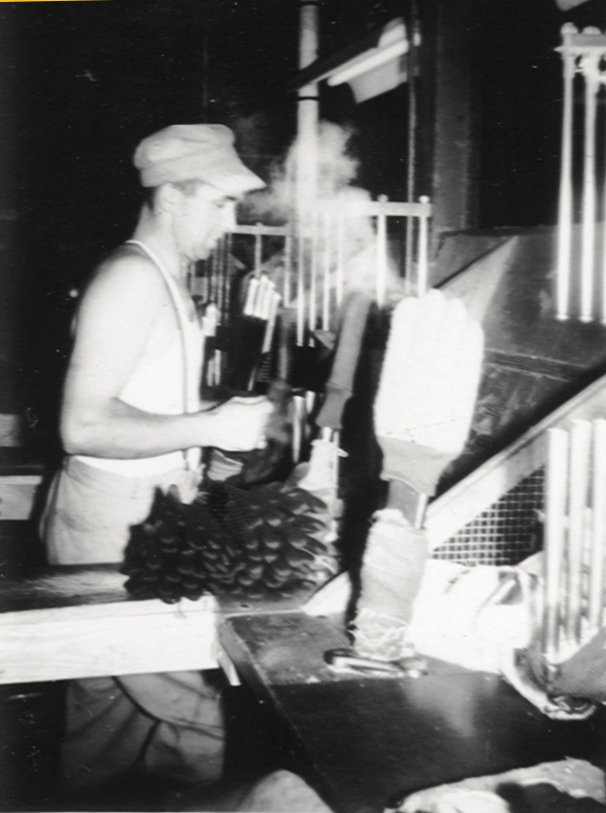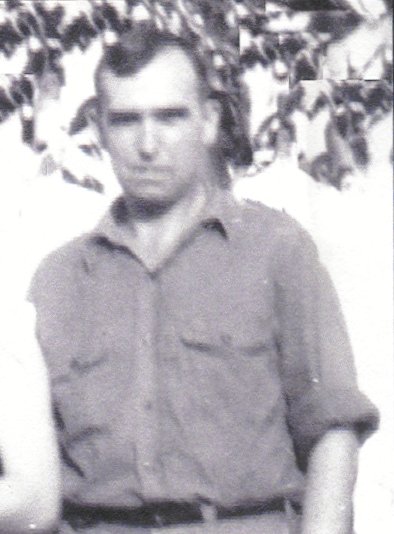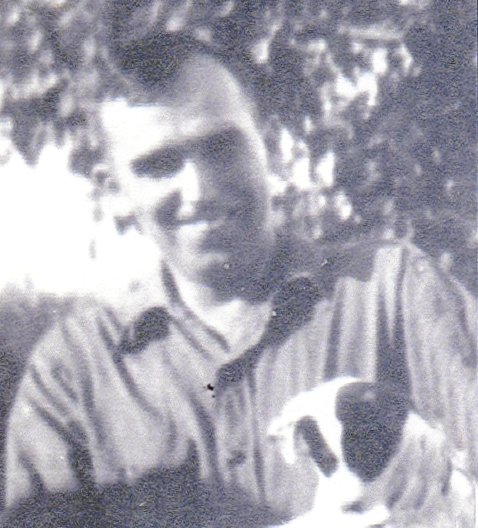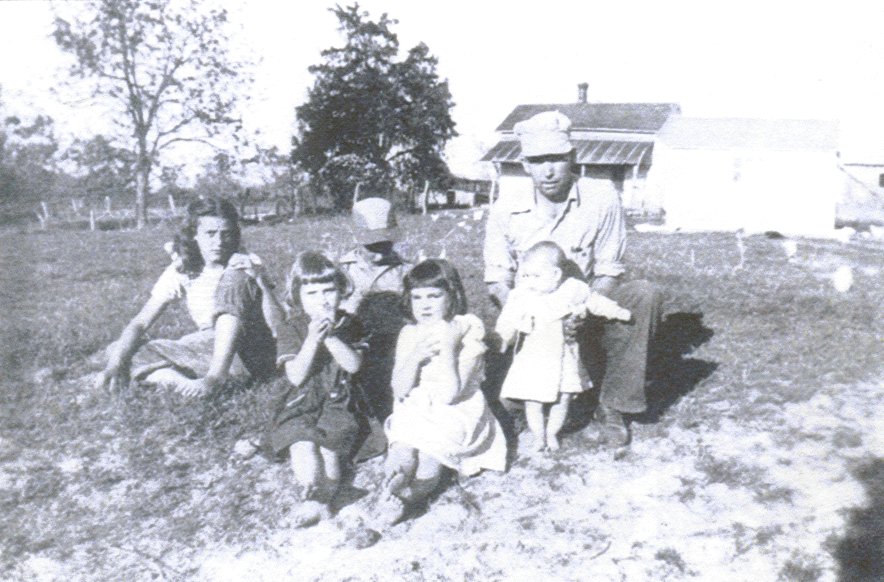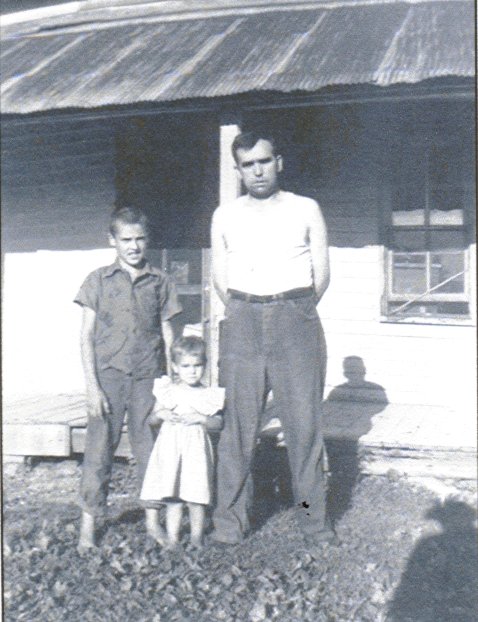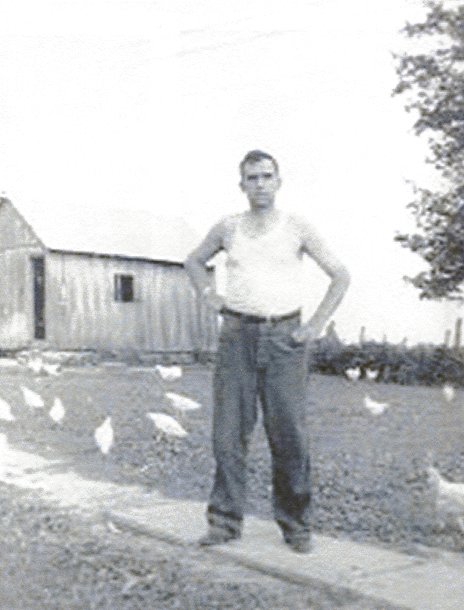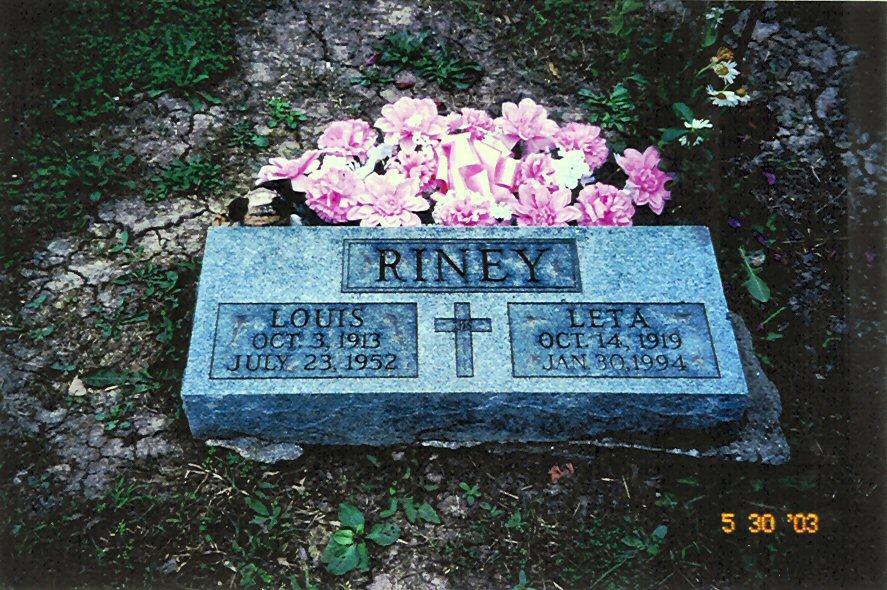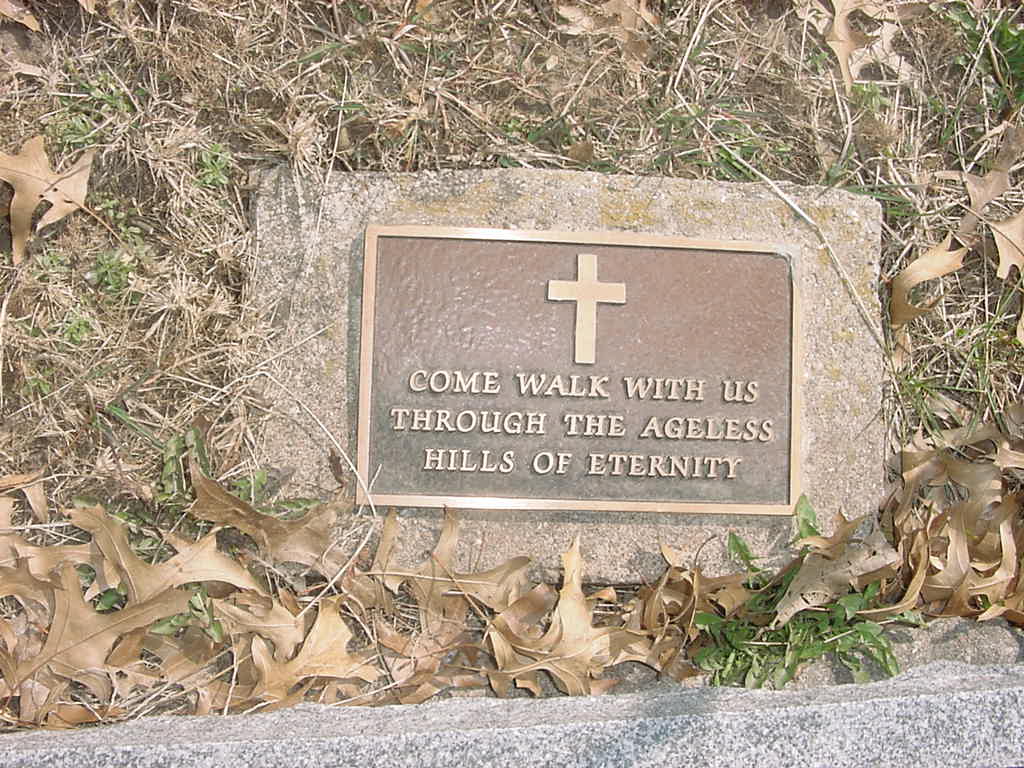Bill's father, Henry Louis Riney, was a good dad and a good man. It was because of his goodness that my grandmother and my mother converted to the Catholic Church. This is what I owe him for more than anything else except giving me the gift of life.
My dad was born in Clark Co., MO, near St. Patrick, the small village which had been established by his great-grandparents in 1833. He was the third child and the first boy born to Franklin Brislin Riney and Lillie Edith Bick, who were farmers in Clark Co. He was named for his two grandfathers, Henry Charles Riney and Lewis Wesley Bick.
When my daddy was fourteen years old, his father died of a heart attack, and his mother had to raise the family, which now numbered two daughters and two sons, alone. I’m sure the children helped as much as possible, but it was very hard for a widow in those days, and she lost the house and had to move into sub-standard housing, where the snow blew in through the cracks in the floor. I think there were some shenanigans from some of the rest of the family, who repossessed the house when they should have set a little more lenient terms for payment. The family probably rented out the arable acres to a farmer who would farm on shares, keeping part of the proceeds from the crops and paying part of it to Grandma Riney. I’m really not sure this was done, but it was done quite often in the area and is still done today.
Grandma Riney did an admirable job continuing to keep the family together. Especially heroic was her effort to make certain that the children were raised Catholic, continuing to send them to school each day at St. Patrick where they would learn the truths of their Catholic faith from the good nuns who taught there and taking them to Mass every Sunday, even though she herself did not attend. When she made her marriage vows to Grandpa Riney, she had promised that the children would all be raised Catholic, and she kept that promise, even though I’m certain it was very difficult at times for her to do so.
Daddy dropped out of school at St. Patrick after he had completed his sophomore year, and it was probably because he had to start working to help support the family. He tried to get all the work he could, but obviously at the age of fourteen, he couldn’t do the farm work alone, and his younger brother was only eleven years old when their father died. I do know that Daddy did work for farmers as soon as he was old enough. This would have been right at the beginning of the Great Depression, and there was not much work to be found. Of course, Grandma Riney would have had a large garden, and they probably had at least one cow for milk and chickens for eggs, and even perhaps would be raising a steer or a pig for meat. I do know my mom said when she married my dad in 1937, his family was much poorer than her family. Daddy’s two sisters got married within a few years of when their dad died, so that helped the situation somewhat, and Daddy would be working to support only his mother, his younger brother, and himself.
Mom has told me that at one time Daddy walked to Beardstown, IL, a distance of 100 miles in order to work. She also told me that one farm wife where Daddy worked was so anti-Catholic that she would either put meat in the cornbread on Friday or, even worse, fix nothing to eat on Friday except meat, since Catholics at that time were not allowed to eat meat on Friday.
The Civilian Conservation Corps (CCC) was a public work relief program established by Franklin Roosevelt, that operated from 1933 to 1942 in the United States for unemployed, unmarried men from relief families, ages 18 to 25. I’m almost sure Daddy worked with them at one time. The Dempsey Highway, which links St. Patrick to the main highway, was built in 1935 by the CCC, and I believe Mom said Daddy helped work on it.
Daddy was in poor health most of his life. I don’t know of any childhood diseases he may have had, but he had a life-threatening illness in his adult years before marrying my mom at the age of 23. I don’t know what the symptoms were, but his mother took him to the hospital. At the hospital, they couldn’t find out what was wrong with him, and they made no bones about telling him and his mother that they were sending him home to die. His mother was not satisfied with this and took him to another doctor, who found a large abscess inside him. I have no idea where but from information I’ve read, it was probably in his spleen. The doctor drained a large amount of pus out of him—I think about two cups—and he fully recovered. This left a permanent in-dentation in his back, which we called his belly hole in his back.
After Mom and Daddy got married, Daddy developed other ailments. At one time, his health was so bad that he was thought to have tuberculosis, and he was sent to a TB sanitarium. They there determined that he didn’t have tuberculosis and sent him home. At another time, the doctor advised Mom and Daddy to move to a drier climate for his health. They had a huge moving sale and sold almost everything, but, as was to prove fortunate later, the farm did not sell. They bought a small trailer, attached it to their car, and left for Texas with Daddy’s younger
brother and his girlfriend. They left the four of us kids with Grandma and Grandpa, intending to send for us after they got settled. Mom even got a job at a bakery in San Antonio, but she was so homesick that they soon returned home. Luckily, they still had the farm to which they could return, but they had to replace everything they had sold, including their farm animals and farm implements, as well as such mundane things as combs, dishes, mirrors, furniture, etc.
As Daddy grew older, he developed or continued to have serious heart problems. He doctored for this for many years. I don’t know what doctor he saw or what the treatment was, but I do know that he was receiving treatment of some kind. Of course, in the late 1940’s and early 1950’s heart treatment would have been pretty primitive.
Daddy did much of the work around the farm, and Grandpa McDaniel helped him with his farm work and Daddy reciprocated. After Mom started working at the glove factory in Canton, she was able to get Daddy hired, too, and that’s where he worked the rest of his life with periodic layoffs, as are encountered at any factory job.
On July 20, 1952, after we had been to Sunday Mass, Mama and Daddy decided to take us to Indian Creek, MO, to a church function which was being held by the priest who had married them at the church where he was now presiding. As we drove through Canton, they stopped at a small grocery store and bought a loaf of bread and lunchmeat, so we wouldn’t need to spend money at the church function. Daddy didn’t realize the meat he was eating was spoiled, and by the time Mom discovered it, Daddy had already eaten his. Even while we were still at the function, Daddy became sick, and I remember seeing him sitting on the ground leaned up against a tree. By the time we returned home, Daddy was sick enough that Mom took him immediately to the hospital in Keokuk, IA, thirty miles away. He had contracted ptomaine poisoning from the spoiled lunch meat. Had he been in good health, his body would probably have been able to counter the illness, but since his heart was so bad, it ended up killing him, and he died, fighting against his illness, on July 23, 1952.
It was a sad time for all of us. We had never expected to lose the Daddy we loved so soon. As was common at the time, his coffin with the body inside was brought back to the house and placed in the corner of the living room, where his many relatives and loved ones came to view the remains. He was buried two days later, July 25, 1952, in the little cemetery behind St. Patrick Church where so many of his loved ones had been buried before him and where what remains of his physical body awaits the Resurrection of the Dead.
******
Louis Riney, son of Frank B. Riney and Lillie Edith Bick Riney, was born in Clark County October 3, 1913, and passed away in St. Joseph's hospital, Keokuk, Iowa, at 1:45 p.m., July 23, being 38 years, 9 months and 30 days of age. Funeral services were held Friday morning at 9:30 at St. Patrick's Catholic church with Rev. Francis O'Duignan officiating and interment in the cemetery near by. His fifteen years of marriage began when he and Leta McDaniel exchanged vows of allegiance in the Canton Rectory before Father Phillip Gannon July 21, 1937. His patience in bearing his illness of weak heart condition and other ailments for years was remarkable. Preceding him in death were his father January 24, 1927 and his mother October 23, 1939. Surviving are his devoted wife and children, Gladys Rose, 14, Billy Frank, 11, Lillie Ann, 8, Violet Bernadette, 7, and Amelia Kathleen, 2. Also surviving are his brother, Walter Riney of Mendon, Ill., and two sisters, Mrs. John Tate of Palmyra, and Mrs. Veldie Stewart of Williamstown, who together with their families sadly mourn his passing. Mr. and Mrs. W. K. McDaniel of Canton, parents-in-law, of and Mrs. Kenneth Tompkins, sister-in-law and her family of Williamstown also survive besides numerous other relatives and friends. Girls who assisted with the lovely floral tributes were Jean Tompkins, Lucy Ellison, Betty Jo Tate, Mary Jean Uhlmeyer, Mary Jane Williams, Ruby Dell Bronestine, and Isabel Martin.
Dear Louis, you have gone from us,
You meant so much to me.
Your soul we humbly give to God,
To spend eternity.
Your mother dear, your father, too,
Have waited there so long,
Kind friends so dear are waiting there
For you to join their throng.
God's will is ours; he gave us you;
Your soul is his indeed;
Return to him, Oh Louis dear;
His earnest call we heed.
Written at the bedside of her dying husband by Mrs. Louis Riney.
Bill's father, Henry Louis Riney, was a good dad and a good man. It was because of his goodness that my grandmother and my mother converted to the Catholic Church. This is what I owe him for more than anything else except giving me the gift of life.
My dad was born in Clark Co., MO, near St. Patrick, the small village which had been established by his great-grandparents in 1833. He was the third child and the first boy born to Franklin Brislin Riney and Lillie Edith Bick, who were farmers in Clark Co. He was named for his two grandfathers, Henry Charles Riney and Lewis Wesley Bick.
When my daddy was fourteen years old, his father died of a heart attack, and his mother had to raise the family, which now numbered two daughters and two sons, alone. I’m sure the children helped as much as possible, but it was very hard for a widow in those days, and she lost the house and had to move into sub-standard housing, where the snow blew in through the cracks in the floor. I think there were some shenanigans from some of the rest of the family, who repossessed the house when they should have set a little more lenient terms for payment. The family probably rented out the arable acres to a farmer who would farm on shares, keeping part of the proceeds from the crops and paying part of it to Grandma Riney. I’m really not sure this was done, but it was done quite often in the area and is still done today.
Grandma Riney did an admirable job continuing to keep the family together. Especially heroic was her effort to make certain that the children were raised Catholic, continuing to send them to school each day at St. Patrick where they would learn the truths of their Catholic faith from the good nuns who taught there and taking them to Mass every Sunday, even though she herself did not attend. When she made her marriage vows to Grandpa Riney, she had promised that the children would all be raised Catholic, and she kept that promise, even though I’m certain it was very difficult at times for her to do so.
Daddy dropped out of school at St. Patrick after he had completed his sophomore year, and it was probably because he had to start working to help support the family. He tried to get all the work he could, but obviously at the age of fourteen, he couldn’t do the farm work alone, and his younger brother was only eleven years old when their father died. I do know that Daddy did work for farmers as soon as he was old enough. This would have been right at the beginning of the Great Depression, and there was not much work to be found. Of course, Grandma Riney would have had a large garden, and they probably had at least one cow for milk and chickens for eggs, and even perhaps would be raising a steer or a pig for meat. I do know my mom said when she married my dad in 1937, his family was much poorer than her family. Daddy’s two sisters got married within a few years of when their dad died, so that helped the situation somewhat, and Daddy would be working to support only his mother, his younger brother, and himself.
Mom has told me that at one time Daddy walked to Beardstown, IL, a distance of 100 miles in order to work. She also told me that one farm wife where Daddy worked was so anti-Catholic that she would either put meat in the cornbread on Friday or, even worse, fix nothing to eat on Friday except meat, since Catholics at that time were not allowed to eat meat on Friday.
The Civilian Conservation Corps (CCC) was a public work relief program established by Franklin Roosevelt, that operated from 1933 to 1942 in the United States for unemployed, unmarried men from relief families, ages 18 to 25. I’m almost sure Daddy worked with them at one time. The Dempsey Highway, which links St. Patrick to the main highway, was built in 1935 by the CCC, and I believe Mom said Daddy helped work on it.
Daddy was in poor health most of his life. I don’t know of any childhood diseases he may have had, but he had a life-threatening illness in his adult years before marrying my mom at the age of 23. I don’t know what the symptoms were, but his mother took him to the hospital. At the hospital, they couldn’t find out what was wrong with him, and they made no bones about telling him and his mother that they were sending him home to die. His mother was not satisfied with this and took him to another doctor, who found a large abscess inside him. I have no idea where but from information I’ve read, it was probably in his spleen. The doctor drained a large amount of pus out of him—I think about two cups—and he fully recovered. This left a permanent in-dentation in his back, which we called his belly hole in his back.
After Mom and Daddy got married, Daddy developed other ailments. At one time, his health was so bad that he was thought to have tuberculosis, and he was sent to a TB sanitarium. They there determined that he didn’t have tuberculosis and sent him home. At another time, the doctor advised Mom and Daddy to move to a drier climate for his health. They had a huge moving sale and sold almost everything, but, as was to prove fortunate later, the farm did not sell. They bought a small trailer, attached it to their car, and left for Texas with Daddy’s younger
brother and his girlfriend. They left the four of us kids with Grandma and Grandpa, intending to send for us after they got settled. Mom even got a job at a bakery in San Antonio, but she was so homesick that they soon returned home. Luckily, they still had the farm to which they could return, but they had to replace everything they had sold, including their farm animals and farm implements, as well as such mundane things as combs, dishes, mirrors, furniture, etc.
As Daddy grew older, he developed or continued to have serious heart problems. He doctored for this for many years. I don’t know what doctor he saw or what the treatment was, but I do know that he was receiving treatment of some kind. Of course, in the late 1940’s and early 1950’s heart treatment would have been pretty primitive.
Daddy did much of the work around the farm, and Grandpa McDaniel helped him with his farm work and Daddy reciprocated. After Mom started working at the glove factory in Canton, she was able to get Daddy hired, too, and that’s where he worked the rest of his life with periodic layoffs, as are encountered at any factory job.
On July 20, 1952, after we had been to Sunday Mass, Mama and Daddy decided to take us to Indian Creek, MO, to a church function which was being held by the priest who had married them at the church where he was now presiding. As we drove through Canton, they stopped at a small grocery store and bought a loaf of bread and lunchmeat, so we wouldn’t need to spend money at the church function. Daddy didn’t realize the meat he was eating was spoiled, and by the time Mom discovered it, Daddy had already eaten his. Even while we were still at the function, Daddy became sick, and I remember seeing him sitting on the ground leaned up against a tree. By the time we returned home, Daddy was sick enough that Mom took him immediately to the hospital in Keokuk, IA, thirty miles away. He had contracted ptomaine poisoning from the spoiled lunch meat. Had he been in good health, his body would probably have been able to counter the illness, but since his heart was so bad, it ended up killing him, and he died, fighting against his illness, on July 23, 1952.
It was a sad time for all of us. We had never expected to lose the Daddy we loved so soon. As was common at the time, his coffin with the body inside was brought back to the house and placed in the corner of the living room, where his many relatives and loved ones came to view the remains. He was buried two days later, July 25, 1952, in the little cemetery behind St. Patrick Church where so many of his loved ones had been buried before him and where what remains of his physical body awaits the Resurrection of the Dead.
******
Louis Riney, son of Frank B. Riney and Lillie Edith Bick Riney, was born in Clark County October 3, 1913, and passed away in St. Joseph's hospital, Keokuk, Iowa, at 1:45 p.m., July 23, being 38 years, 9 months and 30 days of age. Funeral services were held Friday morning at 9:30 at St. Patrick's Catholic church with Rev. Francis O'Duignan officiating and interment in the cemetery near by. His fifteen years of marriage began when he and Leta McDaniel exchanged vows of allegiance in the Canton Rectory before Father Phillip Gannon July 21, 1937. His patience in bearing his illness of weak heart condition and other ailments for years was remarkable. Preceding him in death were his father January 24, 1927 and his mother October 23, 1939. Surviving are his devoted wife and children, Gladys Rose, 14, Billy Frank, 11, Lillie Ann, 8, Violet Bernadette, 7, and Amelia Kathleen, 2. Also surviving are his brother, Walter Riney of Mendon, Ill., and two sisters, Mrs. John Tate of Palmyra, and Mrs. Veldie Stewart of Williamstown, who together with their families sadly mourn his passing. Mr. and Mrs. W. K. McDaniel of Canton, parents-in-law, of and Mrs. Kenneth Tompkins, sister-in-law and her family of Williamstown also survive besides numerous other relatives and friends. Girls who assisted with the lovely floral tributes were Jean Tompkins, Lucy Ellison, Betty Jo Tate, Mary Jean Uhlmeyer, Mary Jane Williams, Ruby Dell Bronestine, and Isabel Martin.
Dear Louis, you have gone from us,
You meant so much to me.
Your soul we humbly give to God,
To spend eternity.
Your mother dear, your father, too,
Have waited there so long,
Kind friends so dear are waiting there
For you to join their throng.
God's will is ours; he gave us you;
Your soul is his indeed;
Return to him, Oh Louis dear;
His earnest call we heed.
Written at the bedside of her dying husband by Mrs. Louis Riney.
